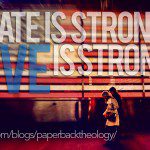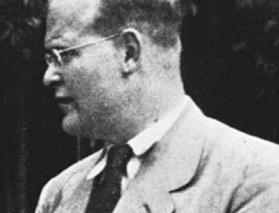Some scholars believe that the apostle Paul’s first letter to the Thessalonians could be the earliest written text in the New Testament (52AD). In chapter 5 there is a curiously short verse which says, “Pray without ceasing.” We all know the verse, and we all typically ignore it. I think we’re missing out on something when we do. I’m convinced constant prayer is not only possible, it is one of the best things about life with God. Anyone can do it & almost nobody does.
One of the chief reasons I think we do not pray without ceasing is that we have such a narrow idea of what prayer actually is. For most of us prayer is where we talk, talk, talk to God – usually asking God for stuff: “Help this good thing happen, don’t let this bad thing happen.” That’s what we think prayer is.
The problem is, what do we do when it doesn’t work? What do we do when we pray and we hear nothing, and nothing changes? Does that mean we don’t have enough faith? Does God not care? Is God not very powerful? The way I was taught to pray was like that – just asking God for stuff. With that tack, God comes off like a temperamental vending machine: put your money in but you may or may not get what you asked for. If that’s what prayer is, then I get why nobody can pray without ceasing, you know?
What if God is everywhere and we just can’t see him? What if the presence of God is continually dancing through our lives but we can’t see it because we’re focused on a bunch of other stuff? How much of God’s activity is going on right beneath our noses and we simply never learned to recognize it?
I believe that it is God great desire, communicated to us over and over in the Bible and traditions of the church, that we could live our lives mindful of the presence of God, and that his presence with us would make all the difference in our lives …heal us, save us. If we would only wake up to the God who is always with us, then we might be more like Jacob after his dream about the ladder and the angels ascending and descending. We might find ourselves saying saying, “Surely God was in the place and I didn’t even know it.”
In the first chapter of An Altar in the World Barbara Brown Taylor riffs on the Jacob story and has this incredible line: “What if God can drop a ladder anywhere.” If God can drop a ladder anywhere in my life… just show up in the ordinary and the mundane, then I have a choice: will I choose to live in the awareness of God’s presence, or will I ignore it. If I say yes to an awareness of God’s presence, then I will begin embracing Paul’s idea of praying without ceasing. This is what I think prayer looks like on the other side of this realization:
1. Prayer isn’t something I generate, it’s something I join in progress. Taylor says, “The longer I practice prayer, the more I think it is something that is always happening, like a radio wave that carries music through the air whether I tune into it or not. This is hard to talk about, which is why prayer is a practice and not a discussion topic.”
2. You can pray wherever, whenever, and however you want. Anything done in the presence of God can become a means of prayer. Whatever you do as are mindful of God’s presence is a kind of a prayer.
3. Prayer isn’t neat and tidy, it’s unvarnished & raw. We can’t edit our lives, then go pray. God gets the director’s cut of our lives. My best prayers typically begin with me saying, “What in the world are you doing? Have you forgotten about us? Why don’t you do something!” God can take the profane words, the bitter attitude, and the disrespectful tone (if you don’t believe me read the psalms of lament). What he can’t tolerate is our fake and sentimental prayers.
4. Prayer is where we begin telling the truth about our own lives. It’s really hard to allow God to show up in our lives, when we can’t even show up in our own lives… living in denial of our own junk. What if the whole reason God says that he will never leave us is so that we’ll have the courage to be ourselves… to acknowledge our own brokenness, hang-ups, our insecurities… anxieties, pain, fear, shame. Prayer is where we begin to learn how to do this… Once we confess things to God, it becomes much easier to be honest with others, too.
Let me just say that I believe in you. You can pray. You don’t have to be religious or pious. You just have to be yourself, present in the moment, mindful of the presence of God.












